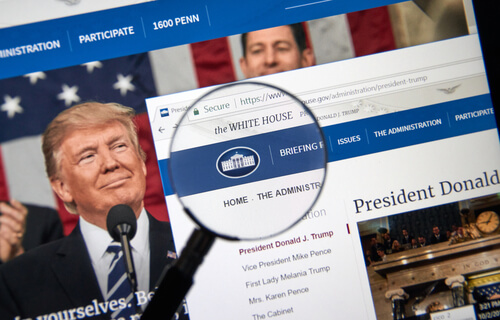
A Light-Touch from Trump Administration Won’t Stifle Blockchain Development in the US

Keep blockchains decentralized and only intervene when necessary; that’s what Acting Under Secretary of State for Economic Growth, Energy, and the Environment, Manisha Singh, believes. Discussing the future of blockchain technology and the US government’s role in its development, Singh has told delegates that a hands-off approach is necessary.
Speaking at the 4th Annual DC Blockchain Summit in Washington, the US politician outlined her vision for blockchains and beyond.
“We want to see other countries adopt light-touch and compatible regulations so the private sector has room to innovate and perfect potential new uses for blockchain. As the government, sometimes the best thing we can do to help is stay out of the way,” Singh said on March 6.
Trump Administration to Let Blockchain Businesses Grow
The liberal attitude toward blockchains is one that echoes the Trump administration’s approach to private businesses. As well as decreased regulation, President Donald Trump has reduced taxes for US business as part of his economic strategy.
Although the policies have drawn criticism from certain quarters, the light-touch approach has won favor with a number of major corporations. In fact, for crypto-based businesses, Trump’s presidency has already had some unexpected benefits.
In 2018, the US-centric approach to politics was hailed as positive for Ripple and XRP. Talking to Ethereum World News, Ripple’s chief market strategist Cory Johnson said that offshore mining farms aren’t an issue with XRP. Because of that, Ripple and its products could become an attractive proposition for politicians looking to integrate blockchains and cryptos into US culture.
Encouraging Times for Blockchain Industry

At its core, blockchain technology was designed to remove the power of central authorities and offer a decentralized way of processing transactions. Although government intervention is inevitable and, in some instances, desirable, too much can counteract the founding principles of what blockchains were designed to do.
With that being the case, recent comments from Singh will come as a welcome break for developers and crypto businesses. In an emerging industry, too many restrictions can stifle growth. Therefore, with the US government insisting that it wants to adopt a light-touch, innovations should be able to flourish.
What’s more, with the US often serving as a proving ground, any moves it makes are likely to be copied by the rest of the world.
Since 2017, blockchains have found their way into a myriad of sectors. From the Bitfury blockchain creating a new music platform to GM Motors partnering with Spring Labs, businesses of all types are harnessing the power of centralized technology.
In fact, as the industry grows, academic institutions are starting to help the next generation of developers. In 2019, the University of Bahrain implemented a new system for validating a student’s credentials while the Open University has collated a list of 14 courses on blockchain technology.
From top to bottom, the industry is growing, something the US government clearly wants to encourage. Although regulation is likely to increase as products are integrated into mainstream markets, it’s encouraging to hear that, in the US at least, oversight is going to be as minimal as possible.
More Resources
Featured image: Dennizn/Shutterstock.com